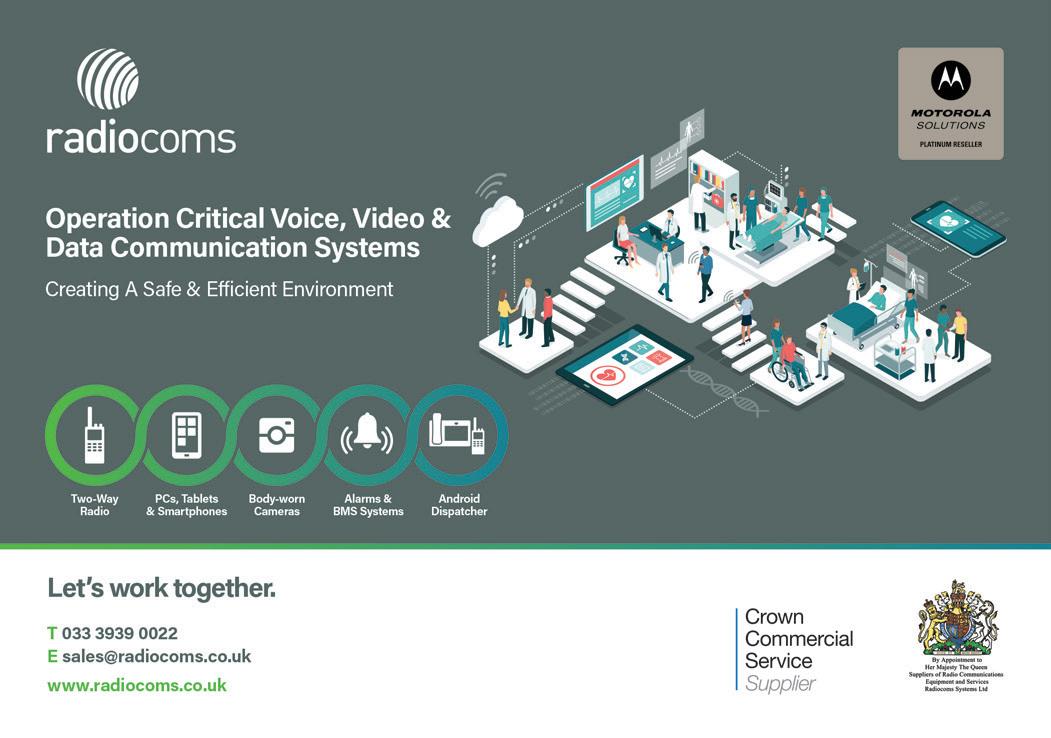
4 minute read
Telecommunications within the healthcare sector
from Health Business 20.2
by PSI Media
Last October, the Network Services 2 framework went live, helping public sector bodies get the best deal on their telecommunications
The new Crown Commercial Service agreement provides access to mobile, voice, video and data services including security and surveillance. It was designed with help from suppliers and customers across the UK, as well as through workshops hosted in partnership with trade body Innopsis and techUK.
There are just shy of 100 suppliers, 58 per cent of whom are small and medium-sized enterprises. It will run for three years, with the option to extend by a further 12 months.
The agreement offers customers a range of primary and ancillary services, including: voice and data provision; internet access; Wi-Fi; radio; security and surveillance; audio and video conferencing; equipment; and maintenance and support services.
Ieuan Trigger, Deputy Director for Technology ate the Crown Commercial Service, said: “Network Services 2 has the capacity to help change the way government bodies and the wider public sector communicate with – and for – the public they serve. By working with customers, suppliers and industry bodies throughout its design and construction we have arrived at an innovative solution which will drive successful transformation across government.”

Telecommunications and coronavirus
Companies such as BT, Virgin Media and Sky have committed to support the NHS with its increased need for connectivity as many essential services have moved online.
In April, the companies agreed to provide confirmed NHS workers with the data, call and text access they need to offer remote consultations at no extra cost. This means that they have and will continue to upgrade NHS workers’ broadband speeds as required to facilitate remote work, sometimes at no extra cost, as well as improve connectivity in care homes and supply full-scale telecoms access to the emergency hospitals being built to combat the virus.
With EE, for example, all that NHS workers have to do is register online with a valid NHS email address to receive the new offer of unlimited mobile data for all NHS staff for the next six months, including those staff already receiving discounts on their monthly mobile plans from EE. They’ll then receive a text message confirming that the unlimited data is on their account, until 9 October 2020. In response to the announcement, NHSX chief executive Matthew Gould said: “Covid-19 has made stark the importance of technology in helping people and those who care for them stay connected. Technology has the potential to be a tremendous force for good in helping the country and its citizens through the crisis, and we are grateful to industry colleagues for offering their support to the NHS.”

Advertisement
Marc Allera, CEO of BT’s Consumer Division, said: “We hope this gives NHS staff one less thing to worry about. They can keep in touch with friends and family and use the internet without worrying about using up their data. Along with the discount we already provide, this is a thank you from all of us at EE to those in the NHS that are working so hard for us all.”
Health information for free
The announcement was the second in as many months by the UK’s largest mobile firms, as Vodafone, EE, O2 and Three confirmed in March that they will give their customers free online access to the latest NHS health information about coronavirus.
The NHS is working with its industry partners to make sure everyone can get NHS information and advice that is verified, up to date and free from misinformation, without using up their data allowance or mobile credit. Therefore, it will now be free to access the following websites: nhs.uk; 111.nhs.uk; wales.nhs.uk; nhsinform.scot; nidirect.gov.uk; and publichealth.hscni.net.
Health Secretary Matt Hancock said: “In the face of the continued spread of coronavirus, it is vital everybody can access the latest verified public health advice on the NHS website when they need to – so everyone knows exactly what they should be doing to keep themselves and others safe. We have been clear this must be a national effort and so I’m delighted that mobile companies will be offering free data to browse nhs.uk. This will ensure everyone can access the guidance they need and avoid dangerous misinformation, without incurring data charges, and is an important contribution to the next stage of our plan to delay the spread of the virus.”
FURTHER INFORMATION: www.crowncommercial.gov.uk/news/ network-services-2-awarded
Hancock and telecommunications
When Matt Hancock became Health Secretary in July 2018, we wrote the following: ‘While Hancock’s health experience may be lacking in comparison with Hunt (Jeremy Hunt, former Health Secretary 2012-2018), who some believe may still have his eyes set on No. 10, Hancock proved very popular and involved at the Department of Digital, Culture, Media and Sport, where upon becoming Culture Secretary he launched his own smartphone app to better ‘connect’ with his constituents. His digital background and enthusiasm could prove very beneficial in promoting the equal distribution and promotion of technology and innovation in all areas of the health service.’
In his first speech after becoming Health Secretary, Hancock has said that £487 million would be spent on technology for the NHS, giving more patients access to health services at home. Approximately £412 million of that figure was to be spent on improving technology in hospitals. In his Future of Healthcare report, he promised that ‘outdated and
obstructive NHS IT systems will become a thing of the past’ and that he planned to introduce minimum technical standards that digital services and IT systems in the NHS would have to meet. Having these open standards in place means systems will be able to talk to each other securely and ensure they are upgradable.










